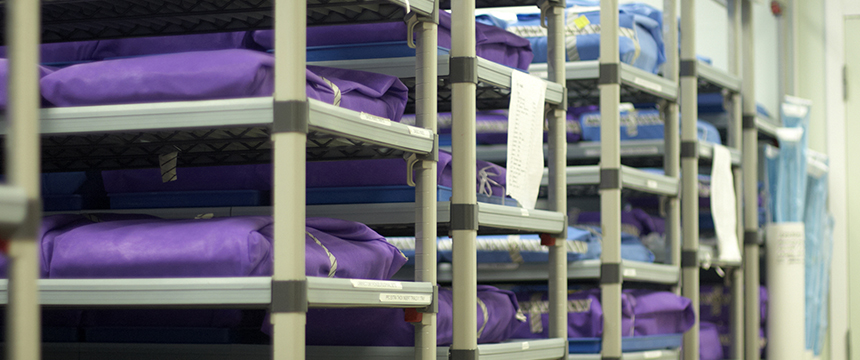FDA Publishes Enforcement Policies to Address Coronavirus Personal Protective Equipment Shortages

In the wake of the COVID-19 pandemic, the FDA has sought to expand the availability of needed personal protective equipment (PPE) for the general public and healthcare professionals. Recently, for example, FDA published two enforcement policies announcing the relaxation of certain premarket review requirements for: (1) face masks and specific respirators (including N95 respirators) and (2) surgical apparel, including gowns and hoods, and examination gloves for both patient examinations and surgeries. As an example of how swiftly regulatory authorities are moving to incorporate developments to date, the guidance for face masks and respirators superseded the prior version for those products issued just the week before, on March 25, 2020. These policies are of particular interest not just to traditional medical device manufacturers but those in other industries pivoting to help increase the supply of PPE.
Under the newly published policies, FDA will not enforce premarket notification (510(k)), registration and listing, quality system regulation (QSR) requirements or unique device identification requirements for medical face masks and surgical face masks if the masks contain appropriate warnings and meet other criteria to prevent undue risks to health. Similarly, FDA will not enforce certain regulatory requirements for various gowns, apparel, and gloves. These two enforcement policies have fomented a number of questions for stakeholders seeking to lawfully market PPE during COVID-19.
Frequently Asked Questions on Masks
I am planning to market face masks for a medical purpose but not to provide liquid barrier protection. The guidance states that the products are eligible for certain relaxed premarket review rules, as long as they do not create undue risk. What constitutes undue risk?
The FDA believes that masks, with or without a face shield, intended for a medical purpose, but NOT intended to provide liquid barrier protection, do not create an undue risk as long as they meet the following criteria:
- They are accurately labeled as a “face mask” (not as a surgical mask or filtering face piece respirator (FFR));
- The labeling includes a list of the body-contacting materials, which MUST NOT include any added drugs or biologics;
- The labeling contains appropriate warnings and precautions for safe use (i.e., recommendations against use in a surgical setting or where there would be significant exposure to liquid, bodily or other hazardous fluids, use in a clinical setting, or use in the presence of a high-intensity heat source or flammable gas);
- The labeling includes appropriate disclosures regarding limitations on use (e.g., makes clear that the mask is not intended for antimicrobial or antiviral protection or infection prevention, and does not contain particulate filtration claims).
To conserve limited resources, I want to decontaminate single-use face masks or filtering face piece respirators (FFR) so that they can be used again. Does the guidance allow me to do this?
Reprocessing of single-use medical devices generally requires submission of a 510(k). However, in order to encourage the conservation of PPE while ensuring safe reuse, the FDA has created an expedited evaluation procedure through its Emergency Use Authorization (EUA) process. Throughout the duration of the public health emergency, manufacturers seeking to decontaminate otherwise disposable face masks or FFRs are advised to contact the FDA and provide certain information to [email protected], if available, about the reprocessing procedures. In order to help facilitate pre-EUA discussions, the FDA recommends that manufacturers provide as much of the data enumerated in the seven categories of information listed on pages 9 and 10 of the guidance document, including a description of the disinfection/decontamination process and controls.
Frequently Asked Questions on Gowns, Apparel & Gloves
I would like to market gowns that claim moderate to high-level barrier protection, such as ANSI/AAMI PB70 Level 3 or 4. Do I need to notify the FDA? Has the FDA waived any of the premarket approval requirements?
In short, during the course of this public health emergency, the FDA does not require premarket notification for these types of gowns and has waivers for other premarket approval requirements, so long as the gowns do not create an undue risk.
As background, gowns that claim moderate to high-level barrier protection, such as ANSI/AAMI PB 70 Level 3 or 4, are regulated by the FDA as “surgical gowns.” FDA considers surgical gowns to be a higher risk “device” than gowns that claim minimal or low levels of barrier protection. This is because these gowns are intended to be worn by operating room personnel during surgical procedures to protect both the patient and operating room personnel from transfer of microorganisms, bodily fluids, and particulate material in moderate- or high-risk situations. Therefore, these gowns have substantial importance in preventing impairment of human health. In fact, the FDA considers such gowns to be class II devices, and, as a result, they are typically subject to the FDA’s 510(k) requirements, as well as FDA’s general controls.
While typically these gowns would be subject to those regulatory requirements, under the new enforcement policy, for the duration of the COVID-19 public health emergency, the FDA stated that manufacturers and distributors of moderate to high-level barrier protection gowns do not need to:
- Submit a premarket notification;
- Follow registration and listing requirements in 21 CFR 807; or
- Abide by Unique Device Identification (UDI) requirements in 21 CFR Parts 830 and 801.20 for gowns that claim moderate or high-level barrier protection.
This assumes that the surgical gowns do not create an undue risk in light of the public health emergency.
I am planning to market surgical gowns. The guidance states that these products are eligible for certain relaxed premarket review rules as long as they do not create undue risk. What constitutes undue risk in this context?
FDA currently believes surgical gowns do not create such an undue risk where:
- Meets liquid barrier protection at Level 3 or higher, consistent with ANSI/AAMI PB70 for the critical zone areas; meets the Class I or Class II flammability standard per 16 CFR Part 1610; and has been demonstrated to be sterile if intended for use in surgical settings;
- The product includes labeling that accurately describes the product’s sterility status (sterile or non-sterile), including any sterilization method used, barrier protection as Level 3, flammability classification (Class I or Class II), and a list of the body contacting materials;
- The product includes labeling with general statements and makes recommendations that would sufficiently reduce the risk of use, for example, a general statement about devices that have not been cleared by FDA, recommendations against use when FDA-cleared surgical gowns are available, and recommendations against use of non-sterile products in surgical settings; and
- The product is not intended for any use that would create an undue risk in light of the public health emergency, for example, the labeling does not include uses for antimicrobial or antiviral protection; uses for infection prevention or reduction; or is labeled as having ANSI/AAMI PB70 Level 4 liquid barrier protection.
I plan to market gowns without any claims regarding antiviral, antimicrobial protection, or use for infection prevention or reduction uses. Are these gowns subject to FDA premarket review?
To the extent you omit claims regarding antiviral, antimicrobial protection, or use for infection prevention or reduction uses, and the gowns qualify as “non-surgical,” no FDA premarket review is required. This assumes that the gowns do not pose an undue risk based on FDA’s “undue risk” factors for non-surgical and minimal-to-low barrier surgical apparel:
- The product includes labeling that accurately describes the product as a “gown,” or “toga,” or other apparel (as opposed to a “surgical gown,” or “surgical toga”) and includes a list of the body contacting materials (which does not include any drugs or biologics);
- The product includes labeling that makes recommendations that would reduce sufficiently the risk of use, for example, recommendations against: use in a surgical setting or where significant exposure to liquid bodily or other hazardous fluids may be expected, use in a clinical setting where Level 3 or 4 protection is warranted, and use in the presence of high intensity heat source or flammable gas; and
- The product is not intended for any use that would create an undue risk in light of the public health emergency (like uses for antimicrobial or antiviral protection or uses for infection prevention or reduction or related uses).
From my research, I know that patient examination gloves are typically subject to FDA’s 510(k) requirements, in addition to Registration and Listing, Quality System Regulation, Unique Device Identification, and certain reporting requirement. I am interested in manufacturing patient examination gloves to help with the PPE shortage. Is the FDA waiving any of its standard premarket review requirements?
Yes. The new enforcement policy states that the FDA does not intend to enforce any of the standard premarket requirements you mentioned for these gloves provided that the product labeling does not create undue risk. FDA believes that such devices do not create an undue risk where, for example, the product includes labeling that:
- Accurately describes the product as an “unpowdered glove” (as opposed to a surgeon’s or patient examination glove);
- Accurately describes its sterility status when individually packaged (non-sterile);
- Does not claim the product as being free of a specific material (e.g., latex free); and
- Includes a list of the body contacting materials.
In summary, it is important for medical device manufacturers and distributors to understand the FDA’s current enforcement policies on PPE products. For more information about current guidance, please contact your Foley relationship partner. For additional web-based resources available to assist you in monitoring the spread of the coronavirus on a global basis, you may wish to visit the CDC and the World Health Organization.
Foley has created a multi-disciplinary and multi-jurisdictional team, which has prepared a wealth of topical client resources and is prepared to help our clients meet the legal and business challenges that the coronavirus outbreak is creating for stakeholders across a range of industries. Click here for Foley’s Coronavirus Resource Center to stay apprised of relevant developments, insights and resources to support your business during this challenging time. To receive this content directly in your inbox, click here and submit the form.


